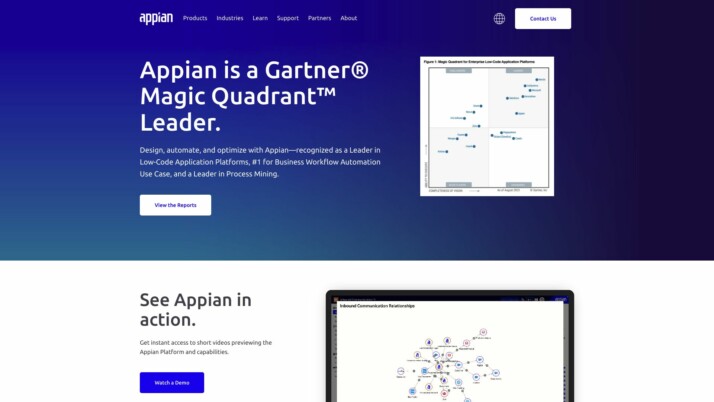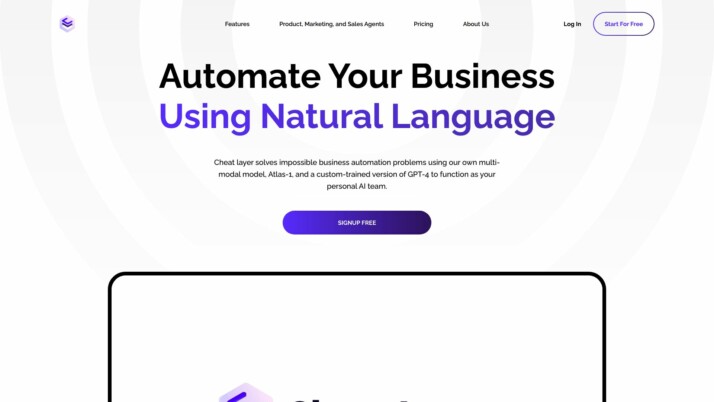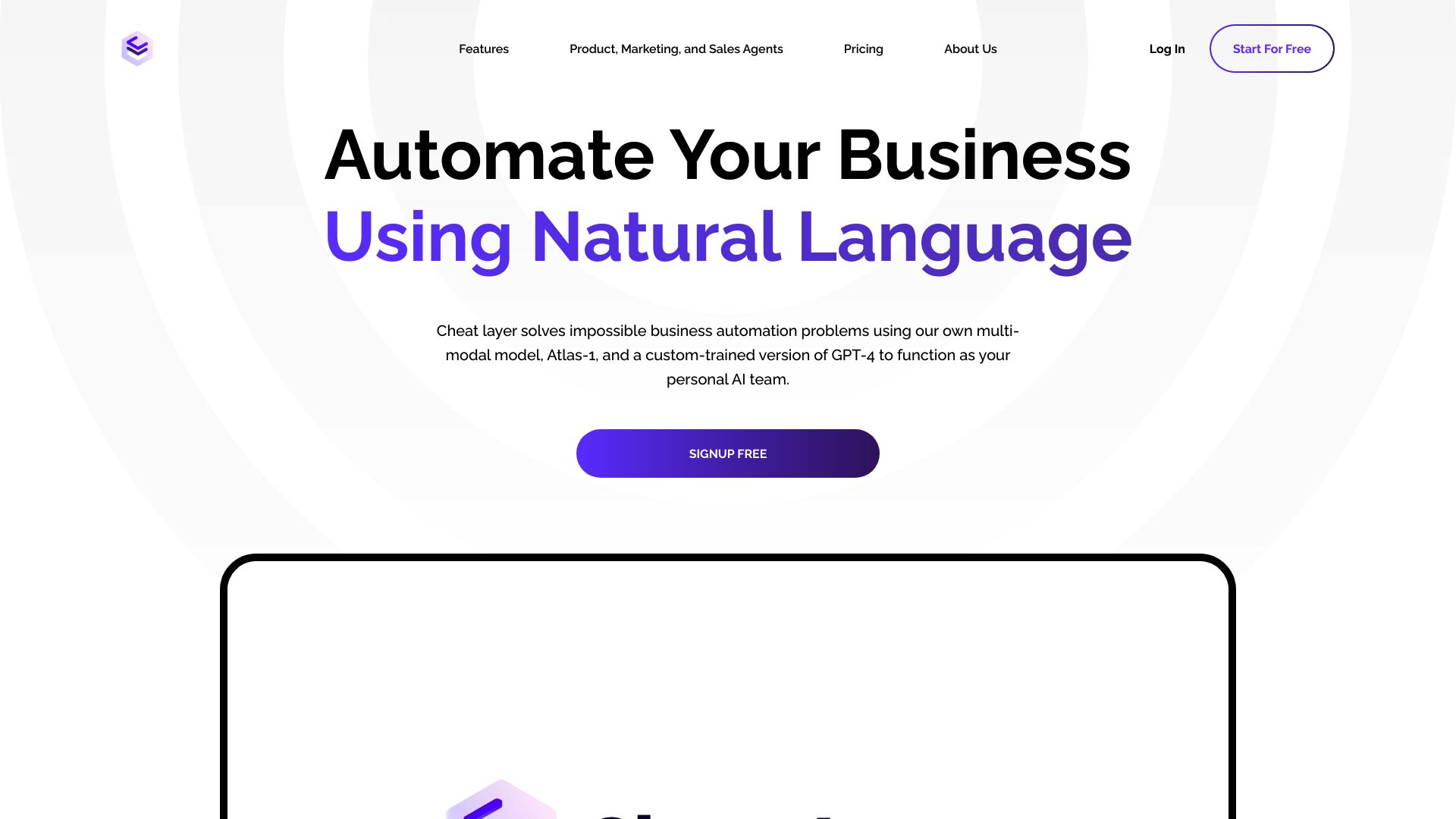Appian vs. Cheat Layer: AI Automation Showdown
AI-powered automation revolutionizes how businesses operate, boosting efficiency and unlocking new capabilities. This review compares three leading platforms: Appian, Cheat Layer, and SmythOS. We examine their unique approaches to AI integration, ease of use, and advanced features. Developers will find insights on API flexibility and customization options.
Business leaders can evaluate enterprise-readiness, scalability, and security measures. For non-technical users, we explore no-code tools and pre-built solutions. Whether you’re a startup founder, an AI researcher, or an industry professional, this comparison provides the essential information to choose the right AI automation platform for your needs.
Appian Overview
Appian delivers a powerful low-code AI platform that empowers organizations to rapidly build and deploy intelligent business applications. The platform combines visual development tools with robust AI capabilities, enabling both technical and non-technical users to create sophisticated AI-powered solutions.


Appian’s AI offerings focus on enhancing business process automation through seamless integration of artificial intelligence. The platform provides pre-built AI skills for document processing, email classification, and text analysis, along with tools to develop custom AI models. This approach allows organizations to infuse AI capabilities into their workflows without requiring deep data science expertise.
Appian’s AI offerings focus on enhancing business process automation through seamless integration of artificial intelligence.
Key features of Appian’s AI platform include low-code model development, built-in AI services, integration with external AI providers, and robust security measures. The platform excels at automating document-centric processes, intelligently routing communications, and providing AI-powered insights to enhance decision making. Appian also emphasizes data privacy, keeping AI models and data within the organization’s control.
While Appian offers powerful AI capabilities, it may have limitations for organizations seeking highly specialized or cutting-edge AI implementations. The platform focuses on practical business applications of AI rather than pushing the boundaries of AI research. Additionally, users looking for extensive multimodal AI capabilities or advanced features like multi-agent collaboration may find Appian’s offerings somewhat constrained in those areas.
Appian positions itself as an enterprise-grade platform, seamlessly integrating AI capabilities with its broader low-code application development and process automation tools. This integrated approach makes Appian particularly well-suited for large organizations looking to modernize their operations and leverage AI across multiple business functions.
Cheat Layer Overview
Cheat Layer revolutionizes business automation by harnessing the power of AI. Their platform leverages a custom-trained version of GPT-4 and a proprietary multi-modal model called Atlas-1 to solve complex automation challenges using natural language. This approach makes advanced automation accessible to users without technical expertise, democratizing AI-driven business solutions.


At the core of Cheat Layer’s offering is the Project Atlas Framework. This innovative system allows users to generate automations of unlimited complexity through simple conversations. By interacting with the system as if speaking to an engineer, users can create end-to-end solutions without writing a single line of code. This natural language approach to automation development sets Cheat Layer apart in the competitive landscape of AI tools.
Cheat Layer revolutionizes business automation by harnessing the power of AI… This approach makes advanced automation accessible to users without technical expertise, democratizing AI-driven business solutions.
Cheat Layer emphasizes robustness and longevity in its automations through the use of Semantic Targets. This feature enables the creation of future-proof automations that remain functional even when target services update their designs. By defining automation targets using natural language, Cheat Layer ensures that solutions built on their platform maintain accuracy and relevance over time, reducing maintenance overhead for users.


The platform offers a range of features designed to streamline the automation process. 1-Click Cloud Agents allow users to deploy pre-built marketing and sales agents directly from mobile devices, automating tasks such as content generation, A/B testing, and lead generation with minimal setup. The Live Mode feature enables iterative building and deployment of products like apps and landing pages, providing real-time feedback to ensure outputs align with intended goals.
Cheat Layer’s no-code interface, featuring a drag-and-drop editor, further simplifies automation creation. This approach makes the platform accessible to a wide range of users, from small business owners to large enterprise teams. Additionally, the platform offers white label solutions, allowing agencies to create and resell custom automation solutions as branded Chrome extensions, opening up new revenue streams for partners.
Cheat Layer’s no-code interface… makes the platform accessible to a wide range of users, from small business owners to large enterprise teams.
While Cheat Layer offers a comprehensive suite of automation tools, it’s worth noting that the platform may have limitations in certain areas. The documentation doesn’t specifically mention features like debug modes, multimodal capabilities, or multi-agent collaboration. Users requiring these specific functionalities may need to explore additional options or consult directly with Cheat Layer for more information.
Feature Comparison
Appian and Cheat Layer offer distinct approaches to AI-powered automation, each with its own strengths and limitations. Appian excels in enterprise-grade low-code development with integrated AI capabilities, while Cheat Layer focuses on natural language-driven automation using advanced language models.
Appian provides a robust platform for building AI-enhanced business applications through its low-code interface. Its strengths lie in document processing, email classification, and seamless integration with existing enterprise systems. However, Appian lacks some advanced AI features like autonomous agents, multi-agent collaboration, and multimodal capabilities.
In contrast, Cheat Layer leverages natural language processing to generate complex automations through conversational interfaces. Its Project Atlas Framework enables users to create sophisticated solutions without coding expertise. Cheat Layer’s emphasis on semantic targeting and future-proof automations addresses long-term maintenance concerns. However, the platform may have limitations in areas like debugging tools and multi-agent collaboration.
Both platforms offer visual builders and no-code options, making AI development accessible to non-technical users. However, SmythOS distinguishes itself by providing a more comprehensive set of AI agent capabilities. Our platform excels in areas where Appian and Cheat Layer fall short, including autonomous agents, multi-agent collaboration, and advanced debugging tools. SmythOS also offers superior flexibility in deployment options and integration with various AI models and APIs.
Feature Comparison Table
| Appian | Cheat Layer | SmythOS | |
|---|---|---|---|
| CORE FEATURES | |||
| Hosted Agents (Dev, Production) | ❌ | ✅ | ✅ |
| Autonomous Agents | ❌ | ✅ | ✅ |
| Multi-Agent Collaboration | ❌ | ✅ | ✅ |
| Agent Work Scheduler | ❌ | ✅ | ✅ |
| SECURITY | |||
| IP Control | ✅ | ❌ | ✅ |
| COMPONENTS | |||
| Foundation AIs | ❌ | ✅ | ✅ |
| Huggingface AIs | ❌ | ❌ | ✅ |
| Zapier APIs | ❌ | ✅ | ✅ |
| Data Lakes | ✅ | ❌ | ✅ |
| DEPLOYMENT OPTIONS (EMBODIMENTS) | |||
| Deploy as Site Chat | ❌ | ✅ | ✅ |
| Deploy as Scheduled Agent | ❌ | ✅ | ✅ |
| Deploy as GPT | ❌ | ✅ | ✅ |
| DATA LAKE SUPPORT | |||
| Hosted Vector Database | ❌ | ❌ | ✅ |
| Sitemap Crawler | ❌ | ✅ | ✅ |
| YouTube Transcript Crawler | ❌ | ✅ | ✅ |
| URL Crawler | ❌ | ✅ | ✅ |
Best Alternative to Appian and Cheat Layer
SmythOS stands out as the superior alternative to Appian and Cheat Layer, offering a comprehensive AI agent development platform that combines power, flexibility, and ease of use. Our drag-and-drop interface simplifies the creation of complex AI workflows, making advanced AI functionalities accessible to users with varying levels of technical expertise.
Unlike Appian’s limited AI capabilities and Cheat Layer’s focus on natural language processing, SmythOS provides a full spectrum of AI agent features. We excel in areas where our competitors fall short, including autonomous agents, multi-agent collaboration, and advanced debugging tools. Our platform supports a wide range of AI models and APIs, giving users unparalleled flexibility in building and deploying AI solutions.
SmythOS stands out as the superior alternative to Appian and Cheat Layer, offering a comprehensive AI agent development platform that combines power, flexibility, and ease of use.
SmythOS offers superior deployment options, allowing users to integrate AI agents seamlessly into existing systems. Whether you need to deploy as an API, webhook, site chat, or scheduled agent, our platform provides the versatility to meet diverse business needs. This flexibility, combined with our scalable architecture, ensures that SmythOS can grow with your organization, handling enterprise-level demands with ease.
Our commitment to security and data privacy sets us apart from competitors. SmythOS incorporates robust features like IP control, data encryption, and OAuth authentication, addressing critical concerns in AI deployment. We also provide extensive data lake support, including a hosted vector database and various data crawlers, enabling users to leverage diverse data sources for training and operating AI agents.
By choosing SmythOS, you’re not just selecting a tool; you’re embracing a platform that empowers you to harness the full potential of AI. Our comprehensive feature set, user-friendly interface, and unlimited use cases make SmythOS the ideal choice for businesses and developers looking to stay at the forefront of AI innovation. Experience the future of AI agent development with SmythOS – where cutting-edge technology meets unparalleled usability.
Conclusion
Appian and Cheat Layer offer compelling AI-powered automation solutions, each with unique strengths. Appian excels in enterprise-grade low-code development with robust AI integration, while Cheat Layer impresses with its natural language-driven approach to complex automations.
However, SmythOS emerges as the superior choice, combining the best of both worlds and pushing beyond their limitations. We offer unparalleled flexibility with our drag-and-drop interface, extensive integration ecosystem, and support for multiple AI models. Our platform enables the creation of sophisticated multi-agent systems, provides advanced debugging tools, and ensures seamless deployment across various environments.
Unlike Appian and Cheat Layer, SmythOS delivers true multimodal capabilities, allowing agents to handle diverse data types effortlessly. Our commitment to scalability, security, and transparency makes us the ideal choice for businesses of all sizes seeking to harness the full potential of AI automation.
Experience the future of AI-powered automation with SmythOS. Create a free account today and discover how our platform can revolutionize your workflow. For a deeper dive into our capabilities, explore our comprehensive documentation or browse our extensive library of AI agent templates to jumpstart your automation journey.
Last updated:
Disclaimer: The information presented in this article is for general informational purposes only and is provided as is. While we strive to keep the content up-to-date and accurate, we make no representations or warranties of any kind, express or implied, about the completeness, accuracy, reliability, suitability, or availability of the information contained in this article.
Any reliance you place on such information is strictly at your own risk. We reserve the right to make additions, deletions, or modifications to the contents of this article at any time without prior notice.
In no event will we be liable for any loss or damage including without limitation, indirect or consequential loss or damage, or any loss or damage whatsoever arising from loss of data, profits, or any other loss not specified herein arising out of, or in connection with, the use of this article.
Despite our best efforts, this article may contain oversights, errors, or omissions. If you notice any inaccuracies or have concerns about the content, please report them through our content feedback form. Your input helps us maintain the quality and reliability of our information.
